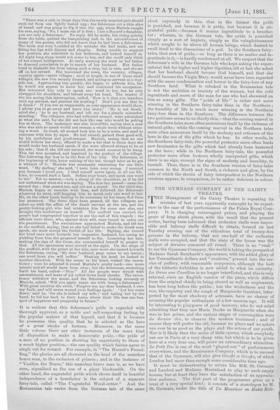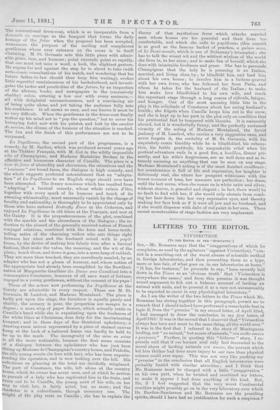THE GYMNASE COMPANY AT THE GAIETY THEATRE.
THE Management of the Gaiety Theatre is repeating its mistake of last year, apparently untaught by its experi- ence in the case of the performances of the Palais Royal Com- pany. It is charging extravagant prices, and playing the game of brag about places, with the result that the present writer, having boon informed that orchestra stalls were impos- sible and balcony stalls difficult to obtain, formed on last Tuesday evening one of the ridiculous total of twenty-five persons in the balcony, that not one-half of the orchestra stalls were occupied, and that the state of the house was the subject of derisive comment all round. There is no "rush" to see the Gymnase Company, the world is taking the prospect of Madame Sarah Bernhardt's appearance, with the added glory of her Transatlantic dollars and " ovations," pressed into the ser- vice of puffery, with reasonable composure, although the bait of the hitherto forbidden is now added to whet its curiosity. La Dame aux Camilias is no longer interdicted, and this is only rational, since an English version of the piece, which differs from the original chiefly in being absurd as well as unpleasant, has been long before the public ; but the wickedness and the woe, the coquetry and the cough of Marguerite Gauthier, inter- preted by the most shadowy of actresses, have no chance of arousing the popular enthusiasm of a few seasons ago. It will be interesting to playgoers of good memory, who do not mind admitting that they saw Mario Doche as Marguerite when she was in her prime, and the various stages of consumption were du dernier air, to observe the modern treatment ; and of course they will prefer the old, because no plays and no actors can ever be as good as the plays and the actors of our youth. Nor is it likely that the series of little operas, which everybody can see in Paris at a very cheap rate, but which is to be given here at a very dear one, will prove an extraordinary attraction. Le Petit Due is one of the most " played-out " of performances everywhere, and the Renaissance Company, which is to succeed that of the Gymnase, will also give aired' at Girofia, of which Loudon had more than enough some considerable time ago. It must be disheartening to actors like MM. St. Germain and Landrol and Madame Montalaud to play to such empty houses, but at least they have the satisfaction of an apprecia- tive audience. The first part of the programme gives us a treat of a very special kind ; it consists or a monologue by M. St. Germain, under the title of Un Monsieur en Habit Noir. The conventional dress-coat, which is as inseparable from a donande en mariage as the bouquet that forms the daily homage of the futur when the proposal has been accepted, announces the purpose of the smiling and complacent gentleman whose easy entrance on the scene is in itself charming. M. St. Germain acts this little piece with admir- able grace, ease, and humour; point succeeds point so rapidly, that one must not miss a word, a look, the slightest gesture. He argues for and against the step he is about to take (with Seno-comic consultations of his watch, and wondering that his future father-in-law should thus keep him waiting), evokes little regretful reminiscences of his bachelorhood, and iuvesti- gates the tastes and proclivities of the future, by an inspection -of the albums, books, and newspapers in the (excessively 'shabby) salon, uttering a bon mot with every sentence,— 'all with delightful unconsciousness, and a convincing air of being quite alone, and yet taking the audience fully into his confidence. It all seems so easy, and one knows it must be so very difficult. When the gentleman in the dress-coat finally makes up his mind not to "pop the question," but to cover his betraying habit noir with his paletot, and bolt by the escalier de service, the climax of the humour of the situation is reached. The fun and the finish of this performance are not to be surpassed.
La Papillonne, the second part of the programme, is a -comedy, by M. Sardou, which was produced several years ago at the Thatre Francais, with M. Got in the wildly impossible rGle of Champignac, and Madame Madeleine Brohan in the effective and humorous character of Camille. The piece is a tour de force of absurdity and cleverness, the situations and the ." business " are broad farce, the dialogue is high comedy, and the whole suggests profound astonishment that an " adapta- tion " of La Papillonne to an English stage should ever have been attempted. The dreary nonsense which has resulted from " adapting " a farcical comedy, whose whole raison d'être, together with every spark of its humour and touch of its amusing whimsicality, must necessarily vanish by the change of locality and nationality, is thoroughly to be appreciated only by those who have endured Butterfly Fever at the Criterion, and enjoyed La Papillonne in old times at the Francais, and now at the Gaiety. It is the preposterousness of the plot, combined with the sparkle and the shrewdness of the dialogue ; the re- duction to the absurd of the generally received notion of French 'conjugal relations, combined with the keen and home-truth- telling satire of the charming widow who sets things right between her niece and the husband seized with la papil- forme, by the device of making him falsely true after a farcical fashion, that make the value, the meaning, and the wit of the piece ; touch these, and down it goes, into a mere heap of rubbish. They are more than touched, they are mercilessly mauled, by an adapter who has not a gleam of humour, and whose notion of the appropriate had already been exemplified by the Bowdleri- sation of Marguerite Gauthier (la Dame aux Camglias) into a consumptive Constance, innocent of all save want of fortune, engaged to a young gentleman, without the consent of his papa Three of the actors now performing La Papillonne at the Gaiety are admirable in every respect. These are M. St. Germain, M. Landrol, and Madame Montalaud. The piece is badly put upon the stage, the furniture is equally gaudy and shabby, the scenery is poor, the properties are meagre to a -degree ; a mere wisp of paper flowers, which actually rattle in 'Camille's hand while she is expatiating upon the freshness of the white lilacs at Christmas, does duty for the incriminating bouquet ; and in these days of fine theatrical upholstery,' a drawing-room mirror represented by a piece of stained canvas bung at the back of a battered frame can hardly be held to be up to the mark. The incongruity of the miss en 8C414 is all the more noticeable, because the first scene consists of a dialogue between the upholsterer who has just been 'fitting up Madame de Chainpignaes country house, and Fridolin, the silly young cousin (in love with her), who has been superin- tending the operation, and is now looking over the bill. His reflections on glancing at the total are decidedly misplaced. The part of Constance, the wife, left alone at the country house, which its owner has never seen, and at which he arrives to pursuit of a lady who has captivated him in the train, and turns out to be Camille, the young aunt of his wife, on her way to visit her, is fairly acted, but no more ; and the character is a subordinate, though necessary one. The Weight of the play rests on Camille ; she has to explain the
theory of that mysterious fever which attacks married men whose homes are too peaceful and their lives too comfortable, and which she calls in papillonno (this conceit is as good as the famous basket of peaches, a quince sous, of Le Demi-monde, which is one of Delaunay's triumphs) ; she has to talk the wisest wit and the wittiest wisdom of the world she lives in, to her niece ; and to make fun of herself, which she does with inimitable liveliness and grace. She has to persuade Champignac that the lady he is pursuing is an Italian, married, and living close.by ; to blindfold him, and lead him about his own house ; to involve him in a furious quarrel with her own lover, who has followed her from Paris, and whom he takes for the husband of the Italian ; to make him make love blindfolded to his own wife, and reach the repentant stage through a long course of ridicule, fatigue, and hunger. One of the most amusing little bits in the play is the solicitude of Constance about her erring husband's health ; she fidgets when Camille keeps him out in the snow, and she is kept up to her part in the plot only on condition that his penitential fast be tempered with biscuits. It is eminently absurd, but it is wonderfully funny, and the perfectly sustained vivacity of the acting of Madame Montaland, the fervid jealousy of M. Landrol, who carries a very suggestive cane, and never forgets it, the credulity of M. St. Germain, with his exquisitely comic timidity while he is blindfolded, his exhaus- tion, his feeble gratitude, his unspeakable relief when his poetical adventure ends in a good fire, a bouillon, dinner pre- sently, and his wife's forgiveness, are as well done and as in- tensely amusing as anything that can be seen on any stage. Madame Montalaud's acting is of the most finished excellence ; her countenance is full of life and expression, her laughter is deliciously real, she utters her pungent witticisms with the truest nuances of tone, her manners are perfection ; her dress, until the last scene, when she comes on in white satin and silver, without sleeves, is graceful and elegant ; in fact, there would be no fault to find with her, if she would only abstain from comb- ing her hair down into her very expressive eyes, and thereby making her face look as if it were all jaw and no forehead, and if she would dispense with dabs of red paint in her ears. These recent monstrosities of stage fashion are very unpleasant.





























 Previous page
Previous page